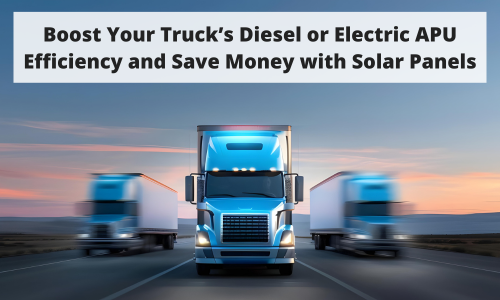
In the trucking world, efficiency and sustainability are critical.
Companies must cut fuel costs and lower emissions to remain competitive and meet regulatory standards.
Solar power can play a vital role in this effort by enhancing the performance of Auxiliary Power Units (APUs), making operations smoother and saving money.
Take this blog post with you!
What Are APUs and Why Are They Important?
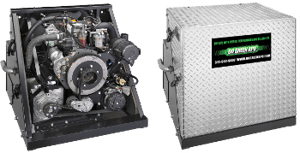
Source: Go-Green
Auxiliary Power Units (APUs) are small engines that keep a truck’s electrical systems, heating, and cooling running while the main engine is off.
This helps drivers stay comfortable during rest periods without idling the main engine, saving fuel and reducing engine wear.
Cost and Benefits of Diesel APUs
Diesel APUs require a significant upfront investment, but they result in long-term cost savings by reducing fuel consumption and lowering main engine maintenance expenses compared to idling a truck without an APU.
However, they do have some drawbacks.
Challenges of Diesel-Powered APUs
Fuel Use and Emissions:

Diesel APUs still use fuel and emit pollutants like nitrogen oxides (NOx), which increases fuel costs and contributes to air pollution.
Maintenance and Costs:

Diesel APUs need regular maintenance, such as oil changes, filter replacements, and engine servicing, which adds to costs and causes downtime.
Noise and Driver Discomfort:

While quieter than the main engine, diesel APUs are still noisy, disturbing drivers while resting.
Performance Issues:
Diesel APUs can have trouble starting in cold weather and perform inconsistently due to fuel quality issues.
How Solar Power Helps Diesel APUs

Adding solar panels to diesel APUs provides extra power, reducing how often the APU engine needs to run.
This leads to:
- Less Fuel Use: Solar panels reduce the engine’s workload, saving fuel.
- Lower Emissions: Using solar power reduces emissions, making fleets greener.
- Regulatory Compliance: Reducing diesel usage helps meet tightening environmental standards, avoiding fines and restrictions that could disrupt operations.
- Longer APU Life: The APU engine runs less, meaning less wear and fewer repairs.
- Better Driver Comfort: Solar energy is quiet and clean, helping drivers rest better.
Electric Power Units (EPUs): A Cleaner Alternative
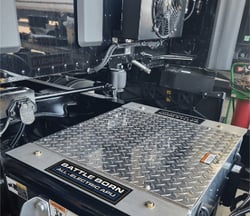
Source: Battle Born Batteries
Electric Power Units (EPUs), also known as Electric APUs, are a cleaner option.
They use onboard batteries instead of fuel to power a truck’s systems.
EPUs are quieter, require less maintenance, and don’t emit pollutants but they also have challenges.
Cost and Benefits of EPUs
EPUs usually cost less upfront than diesel APUs. They save money by cutting fuel costs and needing less maintenance.
EPUs also provide drivers a quieter, more comfortable environment, boosting job satisfaction and safety.
Challenges of EPUs
Limited Battery Capacity:

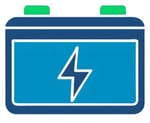
EPUs rely on batteries, which can run out quickly when powering high-demand systems like heating and cooling. This means frequent recharging and possible downtime.
EPUs often need to be recharged during long trips, causing delays and complicating logistics.
How Solar Power Helps EPUs
Solar panels provide steady power to EPUs, helping reduce recharging needs and downtime:
- Longer Battery Life: Solar panels keep batteries charged, reducing the need for frequent recharges.
- Less Downtime: With solar panels, EPUs don’t need to stop as often for recharging, keeping drivers on the road longer.
- Increased Reliability: Solar ensures EPUs work better, even in remote locations.
The Bottom Line: Solar Power is a Smart Investment
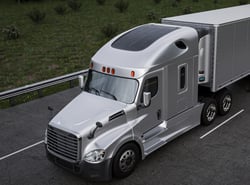
Adding solar panels to APUs and EPUs isn’t just about being green; it’s a smart move for the bottom line.
Solar reduces fuel costs, cuts emissions, extends battery life, and makes drivers more comfortable, making it a solid investment for any trucking fleet.
Why Choose PowerFilm Solar?

At PowerFilm Solar, we don’t believe in one-size-fits-all solutions.
We create custom solutions that meet your specific needs and ensure the best performance.
Here’s why you should choose us:
- Custom Solutions: We design solar systems that match your needs perfectly.
- Experienced Partner: With over 50,000 solar panels delivered to the transportation industry, we know what works.
- Proven Expertise: With 200+ staff years of solar experience, our team has the knowledge and experience to deliver top-quality solutions.
- Decades of Leadership: we've been a trusted leader in solar technology for over thirty-six years, providing reliable, long-term solutions.
- US-Based Support: Our US-based company offers quick, personalized support.
Take the Next Step
Whether you want to add solar to your current fleet or include it in new builds, PowerFilm Solar is here to help.
Contact us today to learn how we can help your fleet become more efficient and sustainable.
Take this blog post with you!